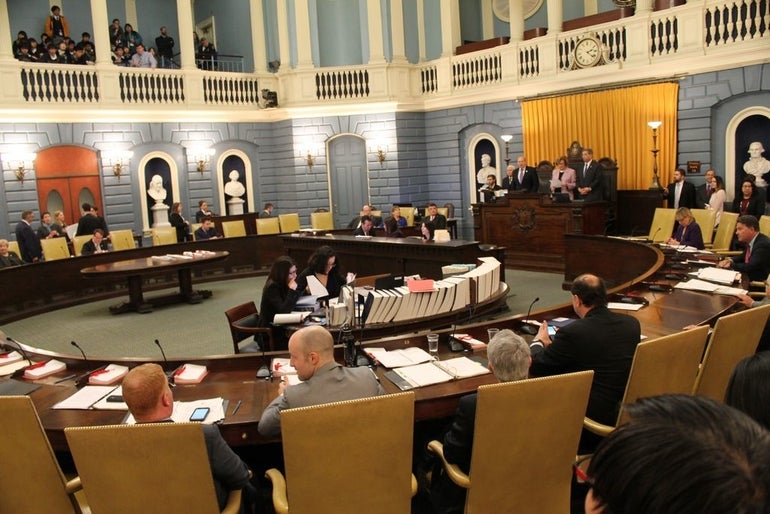The House on Wednesday is set to launch deliberations on a long-term education funding bill and the Senate plans on Thursday to debate its plan to allocate the big fiscal 2019 surplus. Both debates are unfolding over these last days of October, a time when both tax relief and tax increases are in the air on Beacon Hill. House leaders reiterated this week that they plan to debate new revenue proposals for transportation this fall, although they still haven’t outlined any specific plan.
“Groups are really starting to come in now and pitch their own ideas. We’re working with other members of the House to get a sense of what’s palatable and what’s not,” Revenue Committee Chairman Rep. Mark Cusack told the News Service Thursday. “I don’t think there’s anyone that disagrees with doing something. It’s just: what does that actually become and what does that look like and keeping it focused on transportation and not these other ideological topics.”
The $723 million fiscal 2019 closeout budget bill the House sent the Senate includes tax relief for businesses, but not for working families, as Gov. Charlie Baker requested. Baker hopes the Senate will embrace his request for an $87 million dependent children tax break expansion, along with the $37 million dose of business tax relief adopted by the House. Senate leaders also have to decide how much surplus revenue to stash in the state’s savings account after the House upped the ante on that front this week. Business groups persuaded the House to embrace the tax break decoupling from part of the federal tax code, and business lobbyists are now leaning on the House to insist on accountability measures in the education bill after the Senate struck parts of the bill in a bid to preserve local control over education decisions. Look for the education bill to flow from the House Ways and Means Committee soon, and for members to then scramble to draft proposed amendments.
With just over four weeks left for formal sessions, the fiscal 2019 closeout bill appears to be the most pressing matter, since the state comptroller faces a Nov. 1 financial reporting deadline and it appears the branches will have quite a few differences to settle, and not much time to do so, once the Senate agrees to its version of the bill. “We want to do it as soon as possible,” Senate Ways and Means Chairman Michael Rodrigues told the News Service Thursday. “We literally are just getting our first look at it. They completed it late (Wednesday) night. We’ll be going through it line by line, section by section, to see what they’re proposing to balance that against what the governor has proposed in his supp. Remember, he didn’t file it until September. The House had it for six weeks. We’ve had it for less than 12 hours.”
In the coming days, it’s also possible that children’s health legislation could be routed to a conference committee, unless legislative leaders try to more informally reach consensus on the House and Senate-approved bills. The conference committee approach has not worked so far on distracted driving legislation, which appears to have lost its way in a six-member conference that started talks on June 19. Legislative leaders keep saying they’re close to an agreement but their definition of close has itself come under scrutiny, and opponents of electronic device use while driving are infuriated.

